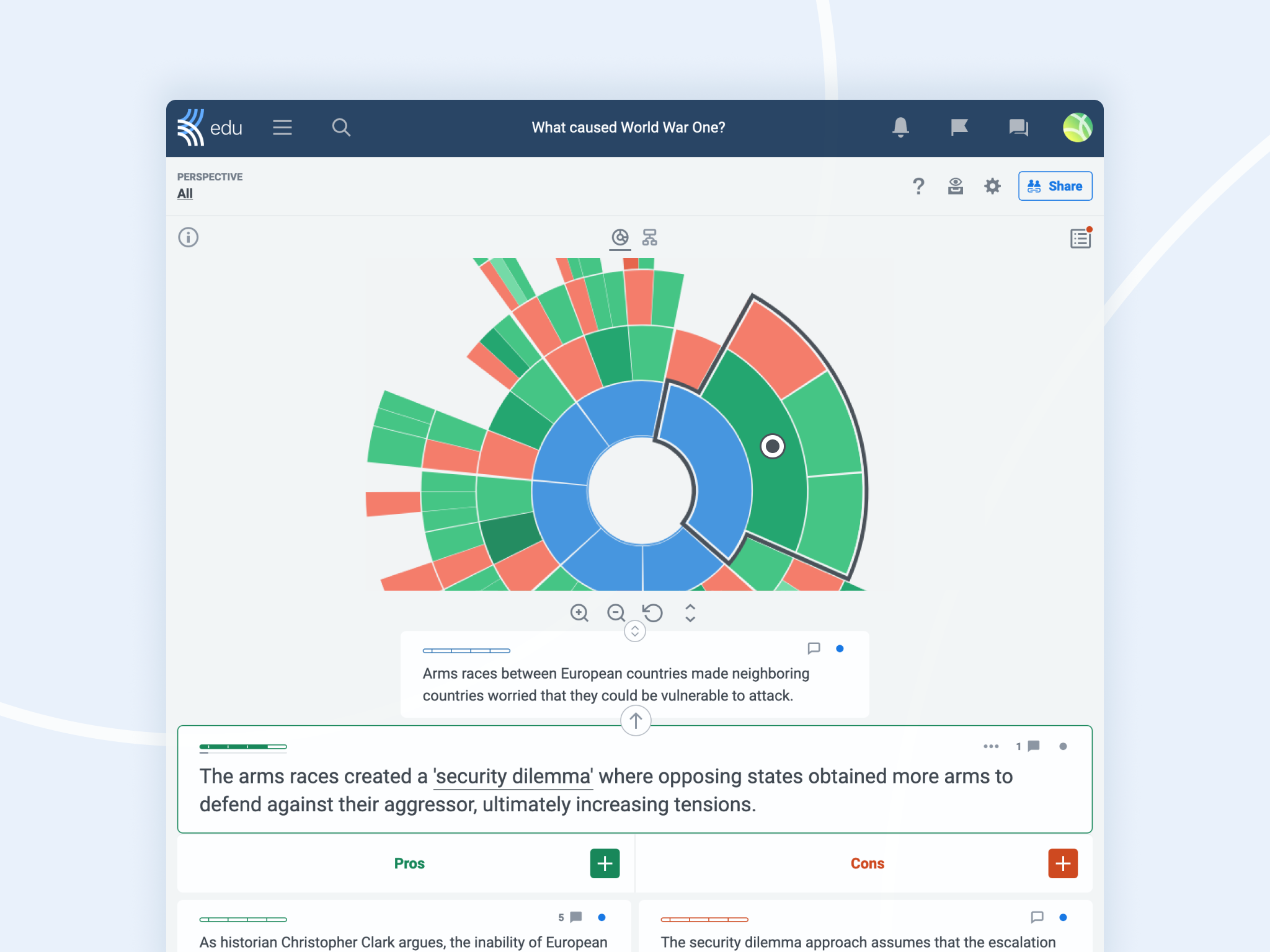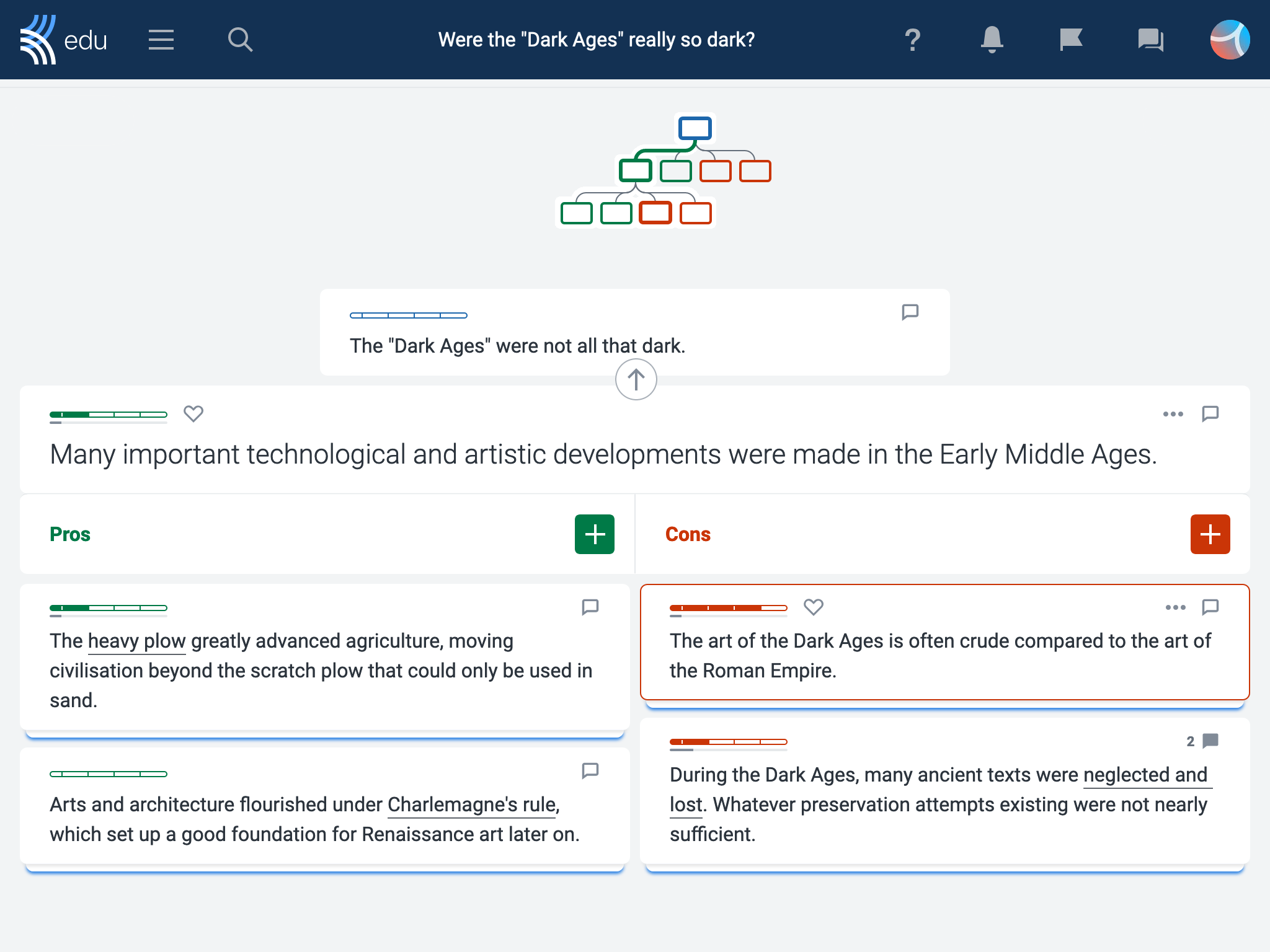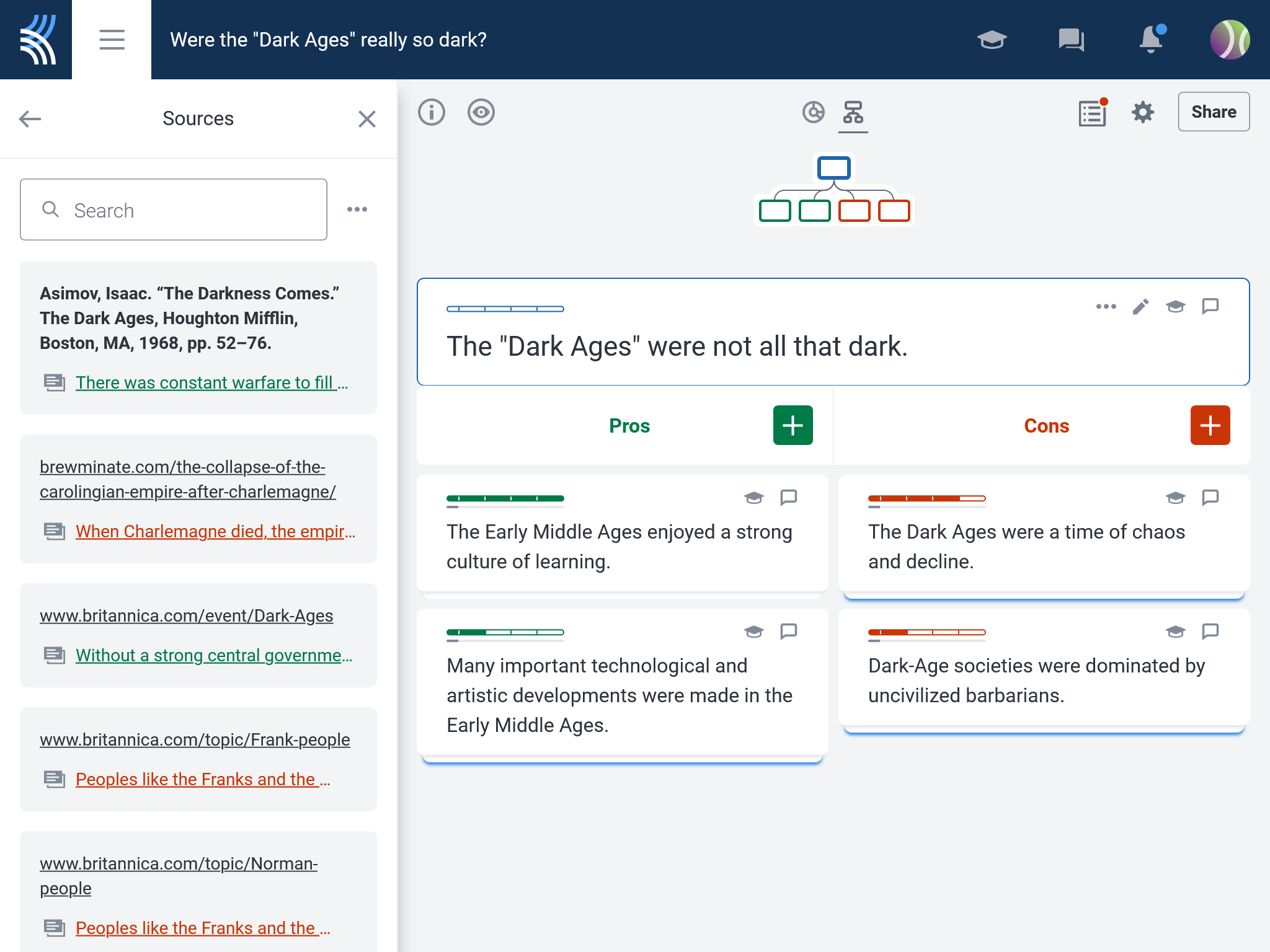It is vital to equip students with the 21st-century skills needed to face future challenges. Perhaps the trickiest skill to purposefully develop in students is critical thinking, which describes the ability to analyze information, evaluate evidence, and draw reasonable conclusions based on sound logic and reasoning.
Luckily, Kialo is purpose-built for this task. Kialo discussions actively engage students to train their logic and reasoning skills and can help students become more autonomous and open-minded thinkers.
Let’s explore how educators can use Kialo discussions to advance students’ critical thinking skills.
How students benefit from critical thinking skills
1. Critical thinking improves student learning outcomes
When students learn how to think critically, they become more active learners capable of applying their knowledge across subject areas.
Cross-subject knowledge transfer means students are better able to learn independently, which in turn leads to better learning outcomes.
That’s because independent learners are self-motivated, making them more likely to persevere in pursuit of their learning goals.
2. Critical thinking helps students become informed citizens
Critical thinking skills are a central pillar of information literacy, and allow students to better assess the reliability of information they come across — especially information found online.
This is essential for students as many get their information from online sources, including social media platforms.
As well as helping students identify misinformation, critical thinking complements the development of students’ civic literacy skills.
The ability to understand different points of view, question political and media rhetoric, and grasp the broader implications of policy decisions empowers students to participate in meaningful discussions about how society functions and their place within it.
3. Students can make better decisions with critical thinking skills

Critical thinking allows students to make informed decisions grounded in evidence. By reflecting on their own thought processes, questioning their assumptions, and understanding the impact of cognitive bias on thinking, students with developed critical thinking skills are better positioned to make good decisions as they progress through life.
4. Students can improve their problem-solving skills through critical thinking
By developing students’ rational capacities, critical thinking helps students become better problem-solvers.
Students who approach problems systematically and remain open to new solutions are better placed to tackle educational and professional challenges. They are also more capable of thinking up innovative solutions to larger societal problems.
Activities to train critical thinking with Kialo discussions
1. Map arguments on Kialo Edu to promote metacognition
Kialo discussions take the form of a map of all the different parts of an argument, providing a unique, visual method for students to see how ideas are related to each other.
Argument mapping has been shown to be one of the most effective ways of cultivating critical thinking skills, as well as facilitating a deeper understanding of the topic at hand.

As students evaluate the relationships between the connected claims, guide them to examine the thinking process being represented in the discussion.
Metacognitive practices like this — in which students think about their own and others’ thinking — help cultivate self-reflection, an essential component of critical thinking.
2. Use Kialo discussions to train students’ reasoning skills
The cornerstone of critical thinking is the use of reason to evaluate evidence, analyze arguments, and arrive at measured conclusions. To improve their reasoning capacities, students need plenty of practice in both developing their own arguments and critiquing those made by others.
Kialo discussions take the form of interconnected lines of reasoning. Within this structure, students are guided to think about the logical relationship between each point they make and the one they are responding to.
You can encourage them to consider whether each of their peers’ claims logically supports or weakens the one above, and even add some of your own faulty reasoning to the discussion to demonstrate common logical fallacies.
3. Use Kialo Edu as a framework for student-led inquiry
Adept critical thinkers are independent learners, capable of leading their own investigations into a topic and constructing their own understanding. Kialo discussions work to promote student autonomy by creating a framework for student-led inquiry into the discussion topic.

First, Kialo discussions begin with a central question. Then, students have complete freedom as to where and how they analyze, respond to, and contribute arguments.
This nonlinear nature of Kialo discussions promotes active learning by asking students to choose which part of the discussion to contribute to.
It also gives students a sense of ownership over their own learning, as they are encouraged to come to their own conclusions rather than simply reproduce answers provided to them.
Similar to other critical-thinking discussion activities such as Socratic seminars, teachers in Kialo discussions can choose the level of guidance to give to students.
You can assign tasks to students to encourage certain types of participation or use the Discussion Chat to bring students’ attention to a particular branch of the discussion that you would like them to develop.
4. Have students collaborate on Kialo Edu to encourage flexible thinking
To become better critical thinkers, students must be open to new ideas — in other words, they must be flexible in the way that they think. Educators can utilize Kialo discussions to encourage flexible thinking in students.
Because Kialo discussions work great as collaborative activities, students are exposed to opinions they may never have even considered. Exposure to a variety of perspectives helps students become more open and flexible thinkers.
Plus, because students’ claims are open to critique by their peers, discussion participants are encouraged to reflect upon their own thinking.
This self-reflection can help students to question their implicit assumptions and biases, and develop a disposition more open to changing their minds on an issue. Upon collaborating in a discussion, ask students to develop counterarguments to their own claims to interrogate their original position on a topic.
5. Use Kialo discussions to practice research and citing sources
Beyond having purely logical connections between claims, Kialo discussions immerse students in developing their research skills and interrogating the evidence behind each other’s assertions.
First, direct students to add sources to their claims. This is an important skill as it requires students to conduct independent research and find reliable sources that support the points being made. Practicing it on Kialo Edu can also greatly benefit students’ research skills for essay writing.

Then, have students practice source criticism by asking them to evaluate how reliable the sources supporting each other’s arguments truly are.
By doing so, they will need to check the veracity of each source, which is a vital component of information and media literacy. At the same time, they are practicing their reasoning skills.
Helping educators to develop students’ critical thinking skills is at the core of Kialo Edu’s mission, which is to make the world a more thoughtful place.
If you have feedback, thoughts, or suggestions about how we can achieve that goal, reach out to us on social media or directly at feedback@kialo-edu.com.

